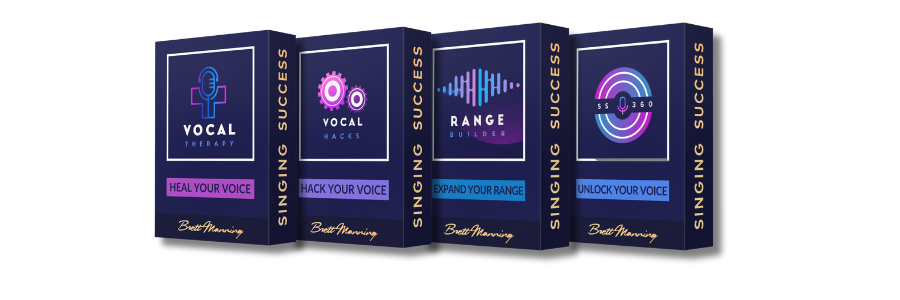[The hardest decision for a singer]
Actually, this could have several subtitles because of the seriousness and complexity of this almost torturous subject, including:
- Every new singer has this problem
- Singing the wrong songs for your voice type
- Imagination and image
- Somebody tell me: who am I
Fast-Track Your Success!!

VIP Membership includes:
- Exclusive Facebook Group
- Interact with our vocal coaches–ask them YOUR question
- Live warmups
- Masterclasses and Q&As with Brett Manning and his guests
- SS360 QuickStart Program
- SS360 – The FULL Systematic Vocal Course
- Vocal Hacks
- Range Builder
- Mastering Mix
- Mastering Harmony
- Mastering Vibrato
- Vocal Therapy
- Plus…exclusive content only found here all along the way!
You can struggle on your own, or you can get direct access to the Nashville Coaches who have launched some of the biggest names in the music industry.
The very reason I thought of this subject for a blog was hearing singer after singer coming up to me asking these questions:
- Who do I sound like?
- What kind of music should I sing?
- Should I sing what everybody expects me to sing or the kind of music I like?
- Do I need to write my own music?
- How do I settle on just one style?
- Is it ok to have extreme diversity in my sound?
- How do I know if I’m on the right path? Is it ok to change my genre or style?
- Can I cross over from pop to country and keep my fan base?
- If people don’t like my music, should I change my tone (sound) or find an audience who likes me?
- Should I go more main stream or indie?
I’m going to apply what I have learned over 35 years in music and the music business in a humble attempt to answer these questions in this article.
Let me first acknowledge that almost no one has a special gift to tell you who you should be as a singer and/or as an artist.
And……
This MAY be the MOST IMPORTANT decision you’ll make a singer…. once you know you can sing.
Finally, I’ll explain how the fear of heights is related to the fear involved in the decision making process.

Defining Your Sound
First, let’s consider the importance of defining your own unique sound and style as a musician and the role that this plays in building a loyal fan base.
If you sound neutral—much like those on news channels speaking “American Standard” dialect—and decide to gut or remove distinctive, possibly quirky or ‘improper’ tones, and pronunciation markers from your voice, then you’ve done nothing to separate yourself from any other singer. This leads me to a quote that my teachers and I often say to our singers…..
“If You’re not Distinct, then You’re Extinct!”
Simply said, your sonic branding must have differentiation to be effective. People need to know it’s you the second you start singing.
If you can be recognized instantly, your voice is already golden! If other singers are making music that imitates your sound design, be flattered. This means you’re an industry icon!
Some extremely diverse examples of singers who’s voices—whether you like them or not—are INSTANTLY recognizable include:
Stevie Wonder, **Leona Lewis, Ray Charles, Britney Spears, Ed Sheeran, Beyonce, Michael Jackson, **Taylor Swift, Chris Martin (Coldplay) **Hayley Williams (of Paramore), **Keith Urban, **Pam Tillis, Steven Tyler (Aerosmith), Adele, **Miley Cyrus, Aretha Franklin, Ellie Goulding, Freddie Mercury (Queen), Patsy Cline, Randy Travis, Robert Plant (Led Zeppelin), **Joy Williams (Civil Wars), Bono (u2), Prince and the king…. Elvis!
**Denotes those I’ve coached. I mention these separate from many others, merely as an example of distinctive voices that were NOT coached (since I have personal knowledge on this point) to change their unique sound.
Steps to Experimentation
Here are some valuable tips for experimenting with different genres, sounds, and instruments to find what feels most authentic and natural for you:
- Try listening to a variety of music from different genres and time periods to discover what resonates with you the most. For example, if you’re primarily a singer-songwriter in the folk or acoustic genre, try listening to some classic rock, jazz, or blues to see if you’re drawn to any particular sounds or elements.
- As you do this, make various playlists on your phone or computer, only adding the songs you like!
- Allow yourself to be surprised! Meaning, don’t freak out when you find yourself liking music you previously would have sworn that you hate!
- Experiment with different instruments to find what feels most comfortable and natural for you. For example, if you primarily play guitar, try picking up a ukulele or mandolin to see if the different sound or playing style inspires new ideas or approaches to your music. Also, sing with piano and notice how different you sound on the exact same song, just changing instruments.
- Don’t be afraid to collaborate with other musicians who have different backgrounds or styles than you. This can help expose you to new sounds and approaches, while helping you grow and evolve as a musician. For example, if you’re primarily a solo artist, consider collaborating with a producer, DJ, or vocalist to create a new sound or style that incorporates your strengths and interests.
- Approach a singer you have at least surface level of contact and familiarity with on social media and invite them to do a ‘collab’ (collaboration). Its the ‘new’ term for doing a live or recorded duet. Usually using a split screen. This will propel you to blend with a voice that is often very different from your own. Don’t be disappointed if it doesn’t work out. You have to try and learn. Making sound decisions can come much later.

Developing Your Own Ability
An important first step is to develop self awareness through doing a bit of your own work. Take regular voice lessons or coaching. Continually develop your own musical ability as you define your sound. Practice regularly. Attend masterclasses, artist bootcamps and workshops. Invest in your own abilities.
Learn to hear yourself openly and honestly. Dare to compare yourself with a singer who’s got 20 years of experience, coaching and fancy production supporting his distinct sound.
While developing, realize that making a decision to change what you might perceive as boring may not always be a good decision. This may require trusted friends and family, coaches and producers. But realize that friends and family are OFTEN the LEAST objective.
I know I can get into some trouble saying this, because I’ve had parents tell me they know the industry better than myself and producers who are making hit records.
Also friends are sometimes foe and other times your cheering section. I’ll explain.
Beware of time and energy suckers who are either blinded by….
JEALOUSY- this form of blindness tells you that you are arrogant for thinking you could ever be good enough to be on the big stage or get 10 thousand—yet alone 10 million—views on YouTube.
or
LOYALTY- The loyal friend will flatter you and tell you what you want to hear. They are the ones who tell you that “You don’t need to get any better…cus you’re already one of the best in the world!” But this is utter nonsense!! Everyone can and needs to get better all the time. You’re either progressing or regressing. No one is staying neutral.
A good coach will encourage you, build your talent, challenge you on a daily basis, be honest about different options for your voice type, and help you chart a course.
Milestones for Music Careers
- Be sure to define clear, specific, and achievable goals for your music career–such as releasing a single or a new album, booking a tour, or even doing a songwriter night at a local coffee shop.
- Focus on reaching a certain number of streams, YouTube plays or followers on social media. Nurture relationships with fans (fans…. sounds kind of strange if you’re new to this) and get a pulse for the music they like to hear from you most!
- Break down larger goals into smaller milestones that are easier to achieve and can be tracked over time, such as writing a certain number of songs per week, practicing a specific technique or vocal lesson from your coach or singing course for a set amount of time each day, or performing at a certain number of local shows per month.
- Set deadlines and timelines for achieving each goal and milestone, and hold yourself accountable for meeting these targets. Become a part of an online singing community–it will keep you ACED: Accountable, Challenged, Encouraged, and Driven!
- Consider using a planner or project management tool to help keep yourself organized and on track.
- Celebrate your successes along the way, no matter how small, and use these victories as motivation to keep pushing yourself and striving for more.
- Be willing to adjust your goals and milestones as needed, based on feedback, changing circumstances, or new opportunities that arise. Don’t be afraid to pivot or change direction if something isn’t working or if you feel that your goals or priorities have shifted over time.

Making a Sound Decision About Sound Decisions
Sound decisions sounds redundant but it’s the double meaning that’s meant to make you think!
A sound decision is a decision making process that is typically ‘sound’ or ‘solid’ advice and is well thought out.
Sound decisions in this context refers to making decisions about how you SOUND rather that how you DECIDE. Hopefully this will stick with you–it is of great importance how you make that final call to pursue a musical direction.
- SFR—Setting Realistic Expectations: As a new artist, it can be tempting to dream big and aim for the stars. Fantasy meet reality every day in the music industry, so it’s important to set realistic expectations for your career, based on your current skills, resources, and industry connections. For example, instead of aiming to sell out a large concert venue right away, sign a big record deal or win a Grammy… start by playing small shows at local clubs or coffeehouses, and gradually build up your fan base and reputation over time.
- SFA—Seeking Feedback and Advice from Trusted Sources: As you develop your sound and build your career, it’s important to seek out feedback and advice from trusted sources, such as various vocal coaches, other musicians, producers, or industry professionals. For example, you could ask a fellow musician to listen to your latest recording (before you’re done with the final mixes, so you can still make easy changes) and offer constructive criticism or suggestions for improvement. You could reach out to a booking agent, manager, performance coach (like my esteemed colleague and dear friend….the great Tom Jackson) or A&R representative for feedback on your live performance or marketing materials.
- BONO—Being Open to New Opportunities and Challenges: In the music industry, things can change quickly and unexpectedly. It’s important to be open—AND READY—for new opportunities and challenges as they arise. For example, you may be offered a last-minute gig at a new venue or asked to collaborate with a new producer or artist. By staying open-minded and flexible, you can take advantage of these opportunities to grow and expand your career and to develop your skills and sound in new and exciting ways. I myself have said YES to projects that I wasn’t really “feeling,” yet the emotional response from the artist’s fan base showed that it was a FAR more sound decision than I ever dreamed! BTW….I initially said no!
The moment you acknowledge your favorite songs—per the playlist creation you’ll make—the faster the individual elements of favorite songs will show up in your own set, reflected in your own ability.
Another unintended consequence of making sound decisions about your sound decisions (especially if you’re clearly on course as a result of a good decision), is that you’ll write new songs and break out of repetitive, narrow patterns. The more you listen to different music to inform your choices, the more you’ll be ok with a different decision when writing a bold lyric or changing course in your melodic selections.
Refining Your Sound and Making Your Own Music
I remember getting a job offer to teach at a college in Florida and accepting the job back in 1993. Only 2 years after full time teaching and I was getting a dream job and dream offer and a chance to live an hour from the beach!
Instead, I made a different decision that was based partly on emotions, partly on my future outcome. I thought I could mix music with a full time student/adjunct professor role—essentially being a “student-teacher” working on a master’s degree—and still have time to practice song writing, create tracks, become a performer and pursue my first love, making music…all while fulfilling my collegiate responsibilities.
But there was a ‘random’ person who confronted me on what I really wanted for my future and reminded me that it is was MY responsibility to find my own music first and accept that this is my life that I have to live. Their hard truth was that I was trying to lead other singers before knowing what it was like to:
Put in the years of necessary practice, build my own audience, record songs, learn about the music business, achieve a higher level of musicality…. BEFORE I jump in and pretend to be an authority on building other artists.
So I decided…. let me make that a little louder….. I DECIDED that no matter the outcome, I would accept that extremely difficult emotional idea that I was making sound decisions about my future and that good decisions are never easy.
You must have humility to listen to others and the sense to listen to your own heart and conscience if you are going to acknowledge your dreams and take the best course for YOURSELF!
Now, listening to myself talk about MY course, MY sense, MY outcome and what I hope to achieve sounds EXTREMELY self absorbed. But it isn’t at all. Let me explain….
In order to give the best version of yourself, while deserving to be heard and for an audience (or students) to notice you, you have to focus on the outcome! You have to become a respectable level of what you wish for others.
Be the person you want to help others become.
I suggest you write a song about this journey, listening to a vast mix of styles until you sense a lyric bursting from your chest and pouring out of your mind.
If you want others to listen to you, then you listen to others first. Listen to advice. Listen to other artists—artists you never have considered. Make sound decisions based on your listening habits.
See how hypnotic that word is…..LISTEN?
That’s because music development stresses skill development, but to change course, you have to challenge your ear.
CIA Your Singing Skills
To truly be an effective singer, you have to have what I call “equal ultimacy” in these three components in your musical development:
Coordinate your Voice. This means, pitch, duration, quality, intrigue, power, control and dynamics.
Inform your Mind. This means a confident understanding of your voice and what constitutes good vocal technique, basic music theory and an overall grasp of the art of music.
Acclimate your Ear. Consume music in mass quantities, of excellent quality, emotional diversity (and sometimes silence….for that is where your mind can create off of what you’ve heard) and train your ear to hear a mix of sounds that you know your voice can confidently reproduce.
Let your ideas flow from the CIA principle. Realize that weakness will be exposed in the narrowness of ideas. Also, creativity flows. Creativity is an endless well.
Music opens the mind. It shifts moods. It causes us to reminisce, re-think old ideas, discover new emotions, recover from heartbreak, enjoy the newness of a spring day, philosophize over the profound cycle of life on a rustic autumn day, endure the bitter cold beauty of a snow capped mountain in January. Music allows us to express thoughts in a distinctive manner that no one else has ever said or sung.
Finding your sound is almost like finding your soul. It is at least a picture of what’s going on inside you. Expressing this is how you live a full and exciting life.
Are you inspired yet? I hope so.

Conclusion
To summarize, I hope that every passionate person reading this does a few things immediately:
- Mix up your playlists and discover a new process of self development
- Start with a certified coach (or coaches) from our talented staff and be challenged to do the the vocal things you never though possible.
- Become a VIP member and get ALL the resources to explode past your limits.
- Take chances. The greater the risk, the greater the reward.
- Be true to yourself!!!






